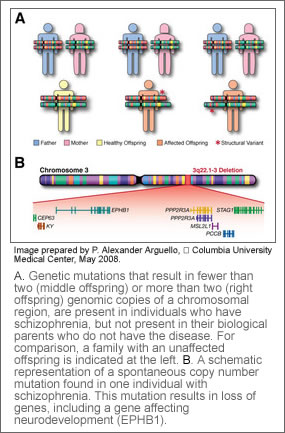 Scans of the genome of patients with schizophrenia have revealed rare spontaneous copy number mutations that account for at least 10 percent of the non-familial cases of the disease. Researchers at Columbia University Medical Center describe specific genetic mutations present in individuals who have schizophrenia, but not present in their biological parents who do not have the disease. These individuals were eight times more likely to have these mutations than unaffected individuals. This new data, reported in the May 30 on-line issue of Nature Genetics, will help researchers account for the persistence of schizophrenia in the population despite low birth rates among people with the disease.
Scans of the genome of patients with schizophrenia have revealed rare spontaneous copy number mutations that account for at least 10 percent of the non-familial cases of the disease. Researchers at Columbia University Medical Center describe specific genetic mutations present in individuals who have schizophrenia, but not present in their biological parents who do not have the disease. These individuals were eight times more likely to have these mutations than unaffected individuals. This new data, reported in the May 30 on-line issue of Nature Genetics, will help researchers account for the persistence of schizophrenia in the population despite low birth rates among people with the disease.
Researchers scanned the genome of 1,077 people which included 152 individuals with schizophrenia, 159 individuals without schizophrenia, and both of their biological parents for copy number mutations. They found mutations, either a gain or loss of genes, in 15 individuals diagnosed with schizophrenia that were not present in the chromosomes of either biological unaffected parent. Only two of such mutations were found in those without schizophrenia. Study subjects were from the European-origin Afrikaner population in South Africa, a genetically homogenous population that is ideal for genetic evaluation. [continue reading…]
